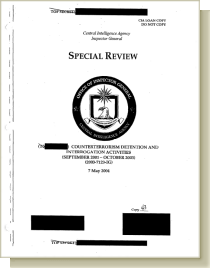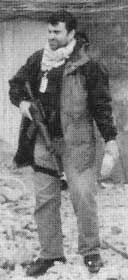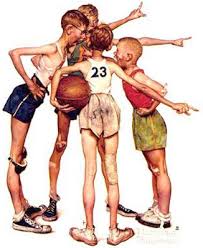 Well, I finally read the recently released version of the CIA OIG Report front to back [COUNTERTERRORISM DETENTION AND INTERROGATION ACTIVITIES (SEPTEMBER 2001- OCTOBER 2003)]. I was impressed with its thoroughness, and with the conduct of most of the CIA Officers who were involved in the Program. While I hated what they did, considering that they were placed in an impossible situation, I thought they showed a lot of professionalism in their implementation of their assigned task – poorly designed and illegal as it was. There were instances where some of them stepped over the line, but that would be expected in such a confusing environment.
Well, I finally read the recently released version of the CIA OIG Report front to back [COUNTERTERRORISM DETENTION AND INTERROGATION ACTIVITIES (SEPTEMBER 2001- OCTOBER 2003)]. I was impressed with its thoroughness, and with the conduct of most of the CIA Officers who were involved in the Program. While I hated what they did, considering that they were placed in an impossible situation, I thought they showed a lot of professionalism in their implementation of their assigned task – poorly designed and illegal as it was. There were instances where some of them stepped over the line, but that would be expected in such a confusing environment.I was bothered by two things. The first was the naive attempts by the DoJ OLC to rationalize that the things we were doing weren’t "Torture," or that we weren’t bound by International Agreements or our own laws for a variety of contrived reasons. Likewise, the CIA seemed to believe that so long as it followed its set of bureaucratic guidelines and had adequate documentation, the program was within the law. In both cases, intellectualized arguments and procedures replaced basic common sense – obvious to anyone reading this report.
 But I was disappointed in the Report for its absence of any real analysis of the overall approach itself. We have been repeatedly reminded that, after 9/11, we were desperate to know al Qaeda’s Plans, and that has been either the stated or implied justification for this over-the-line program’s existence – something like "You got to understand. We’ve got to find out what al Qaeda is up to to protect the American people!" All of us know that, and at some level agree. But is regression to some slightly sanitized ancient torture dungeon the way to achieve that goal? I found nothing in this report that addressed this question directly. In fact, with the exception of the testimony of FBI Agent Ali Soufan in a Congressional Hearing, interviews, and an op-ed, nobody seems to want to address this question.
But I was disappointed in the Report for its absence of any real analysis of the overall approach itself. We have been repeatedly reminded that, after 9/11, we were desperate to know al Qaeda’s Plans, and that has been either the stated or implied justification for this over-the-line program’s existence – something like "You got to understand. We’ve got to find out what al Qaeda is up to to protect the American people!" All of us know that, and at some level agree. But is regression to some slightly sanitized ancient torture dungeon the way to achieve that goal? I found nothing in this report that addressed this question directly. In fact, with the exception of the testimony of FBI Agent Ali Soufan in a Congressional Hearing, interviews, and an op-ed, nobody seems to want to address this question.
I haven’t given it a lot of thought myself, but I’ve teased lawyer friends as follows: "We Psychiatrists and Psychoanalysts try to figure out a patient’s psyche and psychological glitches so we can help them find a more adaptive way to live. You guys do the same thing, except you use your insights to discredit them." It’s a bit too hostile, because the really good lawyers are using their psychological skills to get at the truth too. I’d like to have a shot at saying what I think about approaching the "high value detainees" – realizing full well that my musings are just the thoughts of a retired shrink with zero experience with such people.
Strategy
We all know what’s wrong with Torture. People will tell you anything to get you to stop. Most of the information is misinformation. Since the interrogator doesn’t know when you’re lying and when you just don’t know anything, they’re not going to stop until you tell them something. So you tell them something and they send it back to a jillion analysts who cross-reference it with other information and decide the likelihood that it’s true. We seem to be better at evaluating the truth of information than knowing how to get it.
Torture is a strategy. It’s a way of forcing people into a situation that might make them behave in the way you want them to behave, a way of shaping behavior. Parents try strategies all the time. It’s an inauthentic way of communicating. If I’m dealing with you strategically, I’m an actor. What’s happening inside of me and what you’re seeing are different things. Psychotherapists try such things all the time [particularly young ones]. Unfortunately, their clients are people who were raised by "strategizing" parents and are impervious to such "techniques" – worse, they’re put off and often move on to someone else. In fact, children raised by indirect, strategizing parents are usually paranoid, always looking for the "trick" behind the words.
War
In war, the soldier is asked to reverse his morality. We spend our lives being taught not to hurt or kill others, then we go off to war where the goal is to hurt or kill others. How do we do that? Not easily. Many of the cases of PTSD I personally saw coming out of the Viet Nam War were not the result of something that was done to the soldier, or something he saw. It was from something he did. The trauma is awakening to the "sameness," the humanity of the person you killed or hurt. – a mother’s son, wife’s husband, a child’s father. The soldier has to depersonify the enemy soldier to kill him. And the soldier has to realize that the enemy soldier has depersonified him. It’s an abnormal interpersonal state – killing others. In fact, the "otherness" is what makes it possible. So soldiers talk about ""Japs," "Yanks," "Gooks," "Towel-Heads" – depersonifying terms. They might as well call the enemy "Trolls," or "Evil Step-mothers," or "Orks" [in my mom’s stories, they were the "Wicked Wiggly-Goolies"]. Continuing the depersonification motif of war hardly seems like the right way to approach prisoners. They just keep fighting.
Interrogation
I’ll bet that Ali Soufan is a very authentic guy, a straight shooter. I’d also bet that he would have made a fine psychotherapist. What was his technique? He was authentic and did not let the detainee depersonify him. He treated the detainee like another human being. He confronted the detainee with his simplified ideas and lies. He argued religion, politics, absurd rationalizations. He was a human being encountering another human being head on. In technical terms, he was not being what the detainee had been trained to expect – neither an "other" nor a "strategizer." He was deliberately inducing cognitive dissonance – confronting the detainee with false simplifications of the "enemy." I’ll bet Soufan is a "natural" – someone who just knew when the other person was lying or telling the truth, who just knew when the detainee was speaking authentically or hiding behind a mask.
Rookies
 Our CIA Interrogation Program was being directed by total Rookies: Dick Cheney, David Addington, John Yoo, George Tenet, a couple of military psychologists [Jim Mitchell and Bruce Jessen]. They are not experts, none of them. Our Interrogators acted like monsters, treated the detainees like animals, and used strategies concocted from ancient history and psychology books with no experiential basis. The results were nil. No big surprise. They sent the seasoned Interrogators like Ali Souffan and Steve Gaudin home and kept at it with their Rookies.
Our CIA Interrogation Program was being directed by total Rookies: Dick Cheney, David Addington, John Yoo, George Tenet, a couple of military psychologists [Jim Mitchell and Bruce Jessen]. They are not experts, none of them. Our Interrogators acted like monsters, treated the detainees like animals, and used strategies concocted from ancient history and psychology books with no experiential basis. The results were nil. No big surprise. They sent the seasoned Interrogators like Ali Souffan and Steve Gaudin home and kept at it with their Rookies.
Sorry, the comment form is closed at this time.